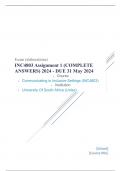Exam (elaborations)
INC4803 Assignment 1 (COMPLETE
ANSWERS) 2024 - DUE 31 May 2024
Course
Communicating in Inclusive Settings (INC4803)
Institution
University Of South Africa (Unisa)
[School]
[Course title]
,Exam (elaborations)
INC4803 Assignment 1 (COMPLETE ANSWERS) 2024 -
DUE 31 May 2024
Course
Communicating in Inclusive Settings (INC4803)
Institution
University Of South Africa (Unisa)
Book
Teaching Students with Special Needs in Inclusive Settings: Pearson
International Edition
INC4803 Assignment 1 (COMPLETE ANSWERS) 2024 - DUE 31 May
2024 ;100% TRUSTED workings, explanations and soluti ons. for
assistance Whats-App...0743275643...........
Question 1 1.1 Define one of the theoretical assumptions of
communication, as discussed in Learning Unit 1, and provide a brief
explanation. (5)
1.2 Compare and contrast Bandura’s social learning theory with Piaget’s
theory of cognitive development in terms of their views on how individuals
learn and develop. (10)
1.1 Theoretical Assumption of Communication:
One theoretical assumption of communication is the "Symbolic Interactionism" perspective.
This assumption posits that individuals create shared meanings through the use of symbols,
such as language and gestures, which shape their interactions and relationships. Symbolic
Interactionism emphasizes the importance of subjective interpretation and social context in
communication, suggesting that meaning is not inherent in symbols but rather negotiated
through social interaction.
Explanation: Symbolic Interactionism suggests that communication is a dynamic process
wherein individuals construct and interpret symbols based on their shared understandings and
social contexts. This assumption highlights the role of language, gestures, and other symbolic
forms in shaping how individuals perceive and make sense of the world around them.
Through ongoing interaction and negotiation, individuals develop shared meanings that
influence their behavior and relationships.
1.2 Comparison of Bandura's Social Learning Theory and Piaget's Theory of Cognitive
Development:
Bandura's Social Learning Theory:
, Bandura's theory emphasizes the role of observation, imitation, and modeling in
learning and development.
According to Bandura, individuals learn by observing the behaviors of others and the
consequences of those behaviors. This process is known as observational learning or
modeling.
Bandura suggests that cognitive factors such as attention, retention, reproduction, and
motivation play crucial roles in the learning process.
Social Learning Theory highlights the importance of vicarious reinforcement, where
individuals learn from the outcomes experienced by others.
Piaget's Theory of Cognitive Development:
Piaget's theory focuses on the cognitive processes that underlie learning and
development, particularly in children.
According to Piaget, individuals go through distinct stages of cognitive development,
each characterized by different ways of thinking and understanding the world.
Piaget proposed that children actively construct their understanding of the world
through processes such as assimilation, accommodation, and equilibration.
Piaget's theory emphasizes the importance of interaction between individuals and
their environments in driving cognitive development.
Comparison:
Both Bandura's Social Learning Theory and Piaget's Theory of Cognitive
Development recognize the significance of interaction between individuals and their
environment in shaping learning and development.
However, Bandura's theory focuses more on social factors such as observation and
modeling, whereas Piaget's theory emphasizes cognitive processes such as
assimilation and accommodation.
Bandura's theory highlights the role of external reinforcement and punishment in
shaping behavior, while Piaget's theory focuses more on internal cognitive processes
and structures.
1.3 Analyse the implications of Skinner's behaviorism theory in shaping
teaching methodologies and classroom management strategies. How can
educators apply the principles of reinforcement to optimise student
learning? (20)
Skinner's behaviorism theory, also known as operant conditioning, has significant
implications for teaching methodologies and classroom management strategies. Operant
conditioning focuses on the relationship between behavior and its consequences, suggesting
that behaviors are strengthened or weakened based on the consequences they produce. Here's
an analysis of the implications of Skinner's theory and how educators can apply its principles
to optimize student learning:
1. Reinforcement and Punishment: Skinner's theory emphasizes the use of
reinforcement, both positive and negative, to increase the likelihood of desired




